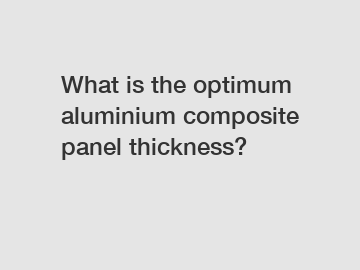Mar. 15, 2024
Construction
Aluminium composite panels, or ACPs, have become a popular choice for architects, designers, and builders when it comes to creating visually appealing and durable building facades. These panels consist of two thin coil-coated aluminum sheets bonded to a non-aluminum core, usually made of polyethylene. One of the key considerations when choosing ACPs for a project is the thickness of the panel. The optimum aluminium composite panel thickness can vary depending on a number of factors, including the intended use of the panels, the design aesthetic of the building, and the budget constraints of the project.
When it comes to ACP thickness, there are typically three options available on the market: 3mm, 4mm, and 6mm. Each thickness has its own set of advantages and limitations, and the choice of thickness should be made based on the specific requirements of the project.
The 3mm thickness is the thinnest option available and is often chosen for projects where weight is a concern. 3mm ACPs are lightweight and easy to handle, making them suitable for projects where ease of installation is important. However, 3mm panels may not be as durable as their thicker counterparts and may not be as suitable for high-traffic areas or areas prone to impact damage.

The most common choice for ACP thickness is the 4mm option. These panels strike a balance between weight and durability, making them a versatile choice for a wide range of applications. 4mm panels are often used for commercial buildings, residential projects, and signage due to their durability and versatility. They are also able to withstand impact and weather conditions, making them suitable for outdoor use.
For projects where additional strength and durability are required, the 6mm ACP thickness may be the best choice. 6mm panels are the thickest option available and offer the highest level of protection against impact and weather conditions. These panels are often chosen for high-traffic areas, industrial buildings, and areas prone to extreme weather conditions. While 6mm panels are heavier and may require additional support during installation, they offer unparalleled strength and durability.
When determining the optimum aluminium composite panel thickness for a project, it is important to consider the specific requirements and constraints of the project. Factors such as the location of the building, the intended use of the panels, and the design aesthetic of the project should all be taken into account when choosing the thickness of the panels.
In addition to the thickness of the panels, it is also important to consider the quality of the materials used in the manufacturing of the ACPs. High-quality materials will ensure that the panels are durable, weather-resistant, and long-lasting. It is important to choose a reputable manufacturer that uses high-quality materials and adheres to industry standards to ensure that the ACPs meet the requirements of the project.
In conclusion, the optimum aluminium composite panel thickness will vary depending on the specific requirements of the project. While 3mm panels are lightweight and easy to handle, 4mm panels strike a balance between weight and durability, and 6mm panels offer the highest level of protection against impact and weather conditions. It is important to carefully consider the specific requirements of the project when choosing the thickness of the panels, as well as the quality of the materials used in the manufacturing process. By selecting the right thickness and high-quality materials, you can ensure that your ACPs will meet the needs of your project and provide long-lasting protection and aesthetic appeal for years to come.
For more information, please visit aluminum coil suppliers near me, food coil, coil coated aluminum.
Previous: Is aluminum good for backsplash?
Next: Ultimate Guide: Aluminum Mesh Screen Uses & Installation Tips
If you are interested in sending in a Guest Blogger Submission,welcome to write for us!
All Comments ( 0 )